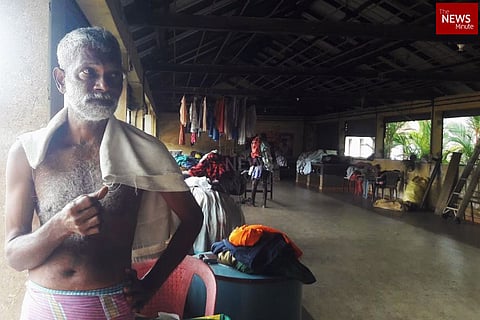

This story is a part of the TNM COVID-19 reporting project. To support this project, make a payment here.
Entering it through a small path beside the Fort Kochi Veli bus station in Kerala’s Ernakulam district, the historic Dhobi Khana looked deserted. Inside, the numerous counters where one would usually witness workers vigorously washing, ironing and drying heaps of clothes, lay mostly vacant. Struck by the pandemic, about 32 families of Kochi’s Dhobi Khana community, who have been continuing the tradition of washing clothes for a living for the past 300 years, struggle to make ends meet.
The roots of the families who work in the Dhobi Khana lie in Tamil Nadu. The community’s history is linked to the colonial past of Kochi – the Dutch who governed the place brought families belonging to the Vannan community from various parts of Tamil Nadu to wash clothes, back in the 1720s.
Despite the flourishing of advanced laundry services, the Dhobi Khana workers always had enough work, continuing the traditional method of washing clothes by hand and drying them in the open air. Scores of people in and around Fort Kochi still continue to depend on them for the quality of laundry services they provide. However, due to the COVID-19 pandemic, for the first time in living memory, the workers are facing a crisis like never before. With hotels and tourist homes shut, and people no longer giving clothes to be washed in the pandemic, the workers have been struggling to make a living over the past one year.
Clad in a towel, 57-year-old AS Jayaprakash was starting to wash the two pieces of clothes he managed to secure, as TNM spoke to him. “Usually during this time we’ll be so busy, there would be continuous work from 5 in the morning till late into the night. But now see, the place is deserted. Only a few people who find some customers come here to work now. This has been so since last year,” says Jayaprakash, as he pours a large jug full of water into the container with clothes.
Jayaprakash washing clothes
Deserted washing counters at Dhobi Khana
While in earlier times, Dhobi Khana clients ranged from government institutions like the Cochin Port Trust or even the cruise ships that dock in Kochi, now their main customers are the homestays, tourist homes and hotels in and around Fort Kochi and some even in Kochi city. “This is the reason we got hit badly. Due to COVID-19, everything has remained shut, there are no tourists and no one gives us clothes,” says ES Kumaresan, another worker.
Though the community has largely been safe from the COVID-19 infection, it is the pandemic induced financial difficulties they grapple with, because adults in most families work in the Dhobi Khana itself. “I have a loan of over Rs 8 lakh that I have to repay. For the past many months, I haven’t been able to pay the instalment as there is no work. It must have become a huge amount by now,” Jayaprakash says. He adds how the families survived majorly on the free food kits and ration received from the government.
Selvi, another worker, explains how difficult it is to run her family on the meagre income. “I have two children, one is in school and the other is in college. Both of them have online classes now. We’re finding it difficult to even recharge phones continuously for them to access the internet. Then there’s the accumulating loan that we took to build a house. It’s really difficult to make ends meet,” says the 48-year-old.
Selvi
While many workers who lost their jobs during the pandemic could venture into other new jobs, the workers of Dhobi Khana faced a difficulty here too. “I’ve been working here since Class 8. Most of us are in the same situation. We can’t find jobs elsewhere, because we don’t know any work other than washing clothes,” says 52-year-old Babu.
Meanwhile, a few others who have grown-up children who work in the private sector have been managing better. Fifty-eight-year-old Adishekaran recalls the ‘lucky’ days before the pandemic when he used to earn up to Rs 5,000 per day. “There were days when I used to make Rs 5,000 per day. Some months, I would even make more money in a month by washing clothes compared to my son who works in a private firm. But now there is no work for most of us. However, my family is stable since my son works elsewhere. But that’s not the case for others,” he says.
July to October used to be the peak time for the workers before COVID-19, as it is the tourist season. With the second wave of the pandemic on the decline, the workers are wishing to find more work in the coming days.
This story is a part of the TNM COVID-19 reporting project. To support this project, make a payment here.
Also read: